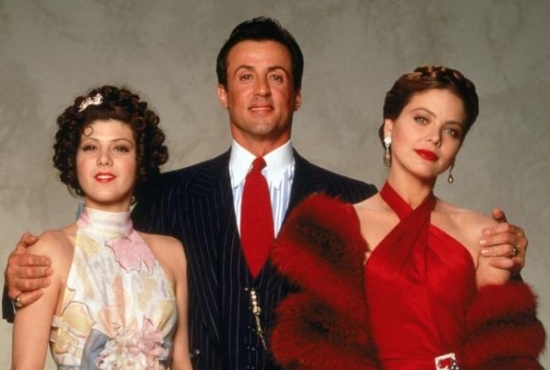Oscar (1991)
Oscar (1991) is a comedy film directed by John Landis and starring Sylvester Stallone in one of his rare comedic roles. The movie, set in the 1930s, is a fast-paced farce filled with mistaken identities, rapid-fire dialogue, and absurd misunderstandings. It is based on a 1958 French play of the same name and showcases Stallone’s surprising flair for humor outside of his typical tough-guy action roles.
The story follows Angelo “Snaps” Provolone (Sylvester Stallone), a notorious gangster who, after promising his dying father (Kirk Douglas) to go straight, tries to leave his life of crime behind and become a legitimate businessman. However, on the very day he plans to go clean, everything that can go wrong does — and hilariously so.

The film begins with Snaps’ father on his deathbed, angrily demanding that his son give up crime and become a respectable man. Moved by guilt and love, Snaps vows to honor his father’s wish. Months later, we find Snaps living in his luxurious mansion, surrounded by servants and bodyguards, preparing for a meeting with a group of bankers who might help him transition into legitimate business.
But before the bankers arrive, chaos erupts. Anthony Rossano (Vincent Spano), Snaps’ timid accountant, confesses that he’s been stealing from Snaps — to the tune of $50,000 — and claims he did it to impress Snaps’ daughter, whom he plans to marry. Snaps is outraged until Anthony clarifies that the woman he loves is “Snaps’ daughter.” However, this turns out to be a case of mistaken identity — Anthony is actually in love with Snaps’ secretary, Lisa, who lied about being his daughter to elevate her social status.

Meanwhile, Snaps’ real daughter, Lisa Provolone (Marisa Tomei), is throwing tantrums because she’s desperate to get married and escape her overprotective father. She’s pretending to be pregnant to speed things up, adding even more confusion to the mix.
As the day unfolds, Snaps juggles multiple crises — the arrival of the bankers, the police who suspect he’s still involved in illegal activities, his bumbling henchmen, and an endless series of people carrying or switching identical black leather bags, each containing something different (money, jewels, or underwear). Every attempt Snaps makes to keep things under control only deepens the chaos, leading to a whirlwind of comic misunderstandings.
In the end, all of the confusions are sorted out — though just barely. The right people end up together, the missing money is found, and Snaps’ efforts to go straight finally begin to bear fruit. Despite the mayhem, Snaps manages to prove to himself and others that he can indeed live an honest life.
Oscar (1991) stands out as a lighthearted, old-fashioned screwball comedy that relies on clever dialogue, timing, and situational humor rather than violence. It gave Stallone a chance to showcase his comedic timing and charm, offering a refreshing contrast to his usual action-hero image. While not a box office hit upon release, Oscar later earned a small cult following among fans who appreciated its witty and nostalgic humor.



